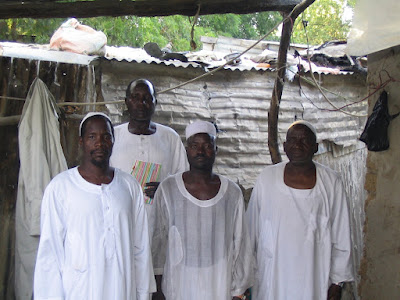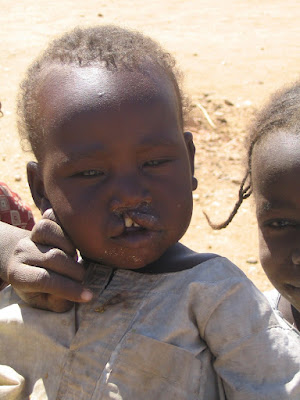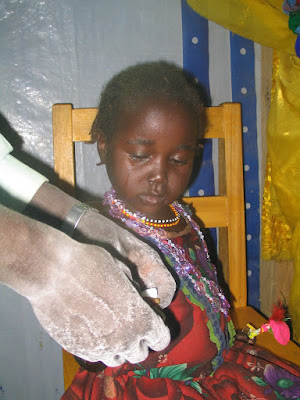Sudan's president charged with genocide
AP
Monday, 14 July 2008
Sudan's president was charged with genocide today, accused of masterminding a campaign to wipe out entire tribes in the war-torn Darfur region.
But Omar al-Bashir is unlikely to be brought before the International Criminal Court soon as his country rejects its authority and senior officials claimed the charges were politically motivated.
However it was the first time prosecutors at the world's first permanent, global war crimes court have issued charges against a sitting head of state.
Head prosecutor Luis Moreno-Ocampo asked a three-judge panel to issue an arrest warrant for al-Bashir to prevent the slow deaths of 2.5 million people forced from their homes in Darfur and still under attack from government-backed janjaweed militia.
"Genocide is a crime of intention, we don't need to wait until these 2.5 million die," he said before the hearing.
"The genocide is ongoing," he added, saying systematic rape was a key element of the campaign. "Seventy-year-old women, six-year-old girls are raped."
Mr Moreno-Ocampo dismissed concerns that his indictment against al-Bashir might ignite a storm of vengeance against Darfur refugees and spur Sudan to shut out relief agencies and possibly peacekeeping troops.
"I am a prosecutor doing a judicial case," he said.
He filed 10 charges: three counts of genocide, five of crimes against humanity and two of murder. Judges are expected to take months to study the evidence before deciding whether to order al-Bashir's arrest.
If they do issue an arrest warrant, they will effectively turn al-Bashir into a prisoner in his own country. In the past, Interpol has issued so-called Red Notices for fugitives wanted by the court, meaning they should be arrested any time they attempt to cross an international border.
Al-Bashir "wants to end the history of the Fur, Masalit and Zaghawa people. I don't have the luxury to look away. I have evidence," the prosecutor said in a statement after submitting his case to the judges.
One victim cited by prosecutors said rapes are woven into the fabric of life in Darfur.
"Maybe around 20 men rape one woman. These things are normal for us here in Darfur," she said. "I have seen rapes too. It does not matter who sees them raping the women - they don't care. They rape girls in front of their mothers and fathers."
Mr Moreno-Ocampo said the rapes were producing a generation of so-called "janjaweed babies" and "an explosion of infanticide" by victims.
But the head of Sudan's Bar Association and ruling party stalwart Fathi Khalil said that Sudan was not a member of the International Criminal Court and was not bound by Mr Moreno-Ocampo's decision.
"The prosecutor of the International Criminal Court with his announcement demanding the arrest of President al-Bashir has proved that he is playing a political role, not a legal one," he said.
He claimed the decision came after international pressure on the court, undermining its reputation and independence. He said neither the ICC nor the UN Security Council have the right to refer a country that is not a member to the ICC to the court.
The Sudanese Liberation Movement-Unity, a rebel group in Darfur, offered to help arrest and extradite any war criminals from Sudan.
MR Moreno-Ocampo said most members of the three targeted ethnic African groups were driven from their homes by Sudanese forces and the janjaweed in 2004. Since then, the janjaweed have been targeting the camps aiming to starve the refugees.
"These 2.5 million people are in camps. They (al-Bashir's forces) don't need gas chambers because the desert will kill them," he said.
The refugees "have no more water, no more food, no more cattle. They have lost everything. They live because international humanitarian organisations are providing food for them," he added.
An estimated 300,000 people have died in Darfur since conflict erupted there in 2003 when local tribes took up arms against al-Bashir's Arab-dominated government in the capital, Khartoum, accusing authorities of years of neglect.
Mr Moreno-Ocampo said the international community needed to act.
"We are dealing with a genocide. Is it easy to stop? No. Do we need to stop? Yes," he said.
"The international community failed in the past, failed to stop Rwanda genocide, failed to stop Balkans crimes," he added.
Al-Bashir's ruling National Congress Party has warned of "more violence and blood" in the vast western region if an arrest warrant was issued for the president.
There are also fears that the fresh Darfur case could spark a backlash against the 9,000-strong UN-African Union peacekeeping force in Darfur.
A spokeswoman for the force said it had not suspended any military operations.
"All essential peacekeeping operations are being carried-out by troops," Shereen Zorba told The Associated Press in an e-mail from Khartoum.
However, she said: "a limited number of operations that carry security risk to civilian staff are temporarily restricted."
New York-based Human Rights Watch welcomed the charges.
"Charging President al-Bashir for the hideous crimes in Darfur shows that no one is above the law," said Richard Dicker, director of the group's International Justice Program. "It is the prosecutor's job to follow the evidence wherever it leads, regardless of official position."
Other international courts previously have indicted Serb leader Slobodan Milosevic and Charles Taylor of Liberia while they were in office. Milosevic died in custody in The Hague in 2006 shortly before the end of his trial.
Taylor is on trial for atrocities in Sierra Leone in a courtroom in the same building where Mr Moreno-Ocampo made his announcement today.






































